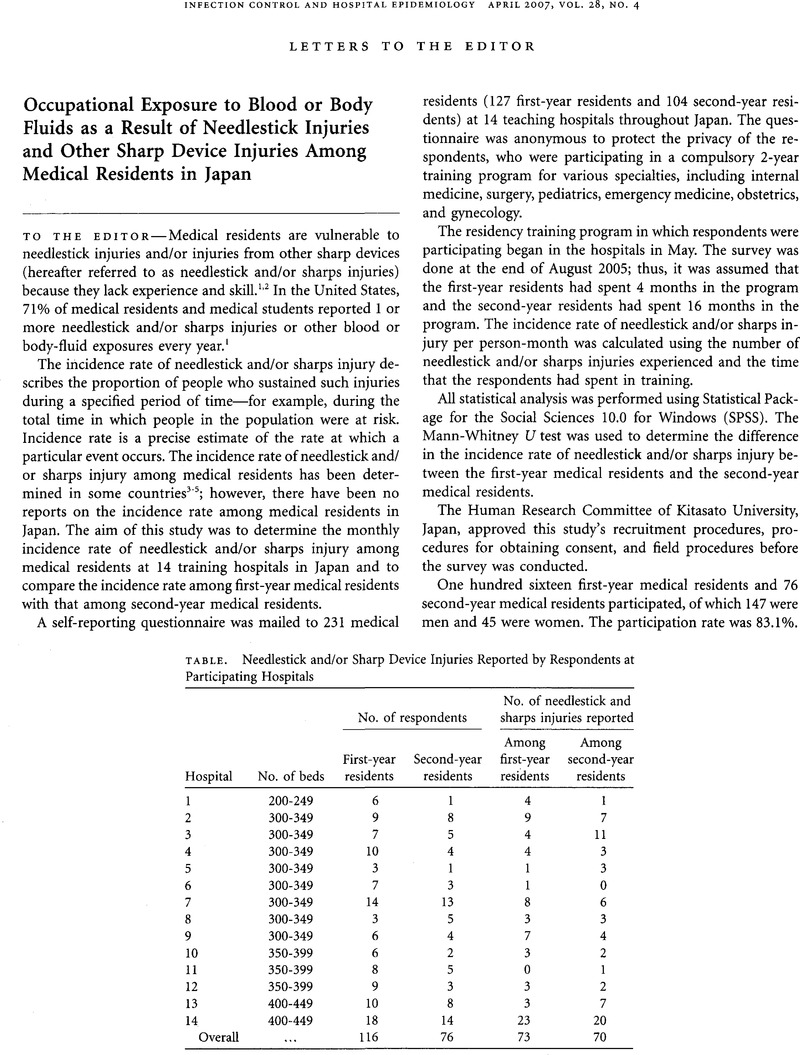Crossref Citations
This article has been cited by the following publications. This list is generated based on data provided by Crossref.
WADA, Koji
SAKATA, Yumi
FUJINO, Yoshihisa
YOSHIKAWA, Toru
TANAKA, Katsutoshi
MIYAJIMA, Eriko
WATANABE, Mitsuyasu
and
AIZAWA, Yoshiharu
2007.
The Association of Needlestick Injury with Depressive Symptoms among First-year Medical Residents in Japan.
Industrial Health,
Vol. 45,
Issue. 6,
p.
750.
Smith, Derek R.
Mihashi, Mutsuko
Adachi, Yasuko
Shouyama, Yukimi
Mouri, Fusayo
Ishibashi, Noriko
and
Ishitake, Tatsuya
2009.
Organizational climate and its relationship with needlestick and sharps injuries among Japanese nurses.
American Journal of Infection Control,
Vol. 37,
Issue. 7,
p.
545.
Naghavi, S. H. R.
and
Sanati, K. A.
2009.
Accidental blood and body fluid exposure among doctors.
Occupational Medicine,
Vol. 59,
Issue. 2,
p.
101.
Karani, H
Rangiah, S
and
Ross, AJ
2011.
Occupational exposure to blood-borne or body fluid pathogens among medical interns at Addington Hospital, Durban.
South African Family Practice,
Vol. 53,
Issue. 5,
p.
462.
Yoshikawa, Toru
Wada, Koji
Lee, Jong Ja
Mitsuda, Toshihiro
Kidouchi, Kiyoshi
Kurosu, Hitomi
Morisawa, Yuji
Aminaka, Mayumi
Okubo, Takashi
Kimura, Satoshi
Moriya, Kyoji
and
Polis, Michael Alan
2013.
Incidence Rate of Needlestick and Sharps Injuries in 67 Japanese Hospitals: A National Surveillance Study.
PLoS ONE,
Vol. 8,
Issue. 10,
p.
e77524.
WADA, Koji
YOSHIKAWA, Toru
LEE, Jong Ja
MITSUDA, Toshihiro
KIDOUCHI, Kiyoshi
KUROSU, Hitomi
MORISAWA, Yuji
AMINAKA, Mayumi
OKUBO, Takashi
KIMURA, Satoshi
and
MORIYA, Kyoji
2016.
Sharp injuries in Japanese operating theaters of HIV/AIDS referral hospitals 2009–2011.
INDUSTRIAL HEALTH,
Vol. 54,
Issue. 3,
p.
224.
Basso, Antonella
Serra, Rosaria
Drago, Ignazio
Soleo, Leonardo
and
Lovreglio, Piero
2016.
Biological accidents at work among resident physicians in specialist training at Bari University Hospital, Italy.
American Journal of Infection Control,
Vol. 44,
Issue. 11,
p.
e265.
WADA, Koji
YOSHIKAWA, Toru
LEE, Muneko
MITSUDA, Toshihiro
KIDOUCHI, Kiyoshi
AMINAKA, Mayumi
KUROSU, Hitomi
MORISAWA, Yuji
and
MORIYA, Kyoji
2017.
Characteristics of Needlestick and Sharps Injuries Occurring Inside or Outside Patient Rooms in Medical Institutions Participating in Japan-EPINet Surveillance: Fiscal 2013-2014.
Japanese Journal of Infection Prevention and Control,
Vol. 32,
Issue. 1,
p.
6.
El-Sayed, Hesham
Mehanna, Sohair
Maraghy, Nermine El
Younes, Soha
Hassan, Adel
Sheded, Mahmoud
and
Khedr, Zeinab
2019.
Assessment of doctors’ knowledge, attitude and practice for hepatitis C virus infection control guidelines in Egypt.
Archives of Medical Science – Civilization Diseases,
Vol. 4,
Issue. 1,
p.
34.
El Sebaey, Aya Farag
Atlam, Samir Abd El Mageed
El Kafas, El Sayed Abd El Rahman
and
Zayed, Hanaa Abdelaziz
2022.
Effect of infection control training course on knowledge and practices of medical interns in a large academic hospital in Egypt: an intervention study.
Environmental Science and Pollution Research,
Vol. 29,
Issue. 10,
p.
14371.
ANUPRIYA ASAITHAMBI
PRIYA BANTHAVI SIVA SUBRAMANIAN
and
CHITRA RAJALAKSHMI PARTHASARATHY
2024.
A STUDY ON WORK SAFETY FOR EMPLOYEES IN DIAGNOSTIC SERVICES – RECOMMENDATIONS TO IMPROVE WORK SAFETY.
Asian Journal of Pharmaceutical and Clinical Research,
p.
108.



